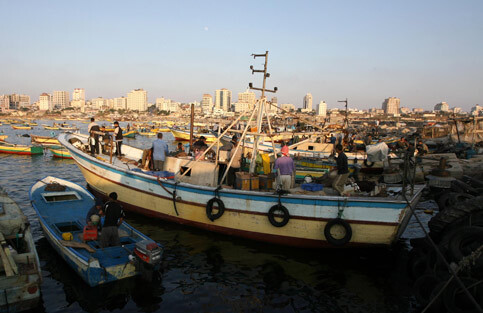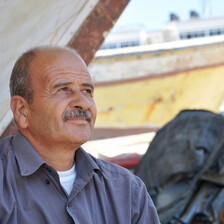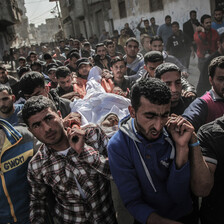The Electronic Intifada 16 June 2008

Palestinian fisherman on their boats in the Gaza port in Gaza City, May 2008. (Wissam Nassar/MaanImages)
GAZA CITY, 16 June (IPS) - When the broiling sun sinks behind the rolling Mediterranean sea in Gaza, hundreds of fishing boats turn on their motors and assemble ragged nets to round up the evening catch. Flickering blue lights scatter across the shallow seas as the boats gather offshore in close quarters. Mackerel, sardine and grey mullet are caught in nets and dumped into plastic crates to be sold in the street markets. But under severe military occupation dominating the Gaza strip, it has become increasingly difficult to make a living as a Gaza fisherman.
Since the Israeli-imposed sanctions against Gaza began in June 2007, extreme pressure intended to further isolate the democratically-elected Hamas leadership has resulted in massive fuel shortages and a near-total collapse of basic economic infrastructure. Factories have had to shut their doors, and all exports have ground to a halt as a result of the blockade policy.
Electricity across Gaza is intermittent, and sewage treatment plants are having to cut back their processing schedules, or abandon operations altogether. Millions of gallons of raw sewage are being dumped, therefore, into the sea, creating serious health risks at a time when hospitals and clinics across the Gaza strip are also suffering medicine and equipment shortages due to the Israeli blockade.
IPS reporter Mohammed Omer first documented the siege against the Gazan fishing economy in early May. Since that report, the fuel crisis has further tightened, and Palestinians now use rationed cooking gas or cooking oil to fuel their cars, generators and electric motors.
The once-clogged streets inside Gaza are now almost emptied of vehicles. For most consumers who can afford petrol, the lines are long, and the local Hamas government mandates strict rations.
As the economic blockade persists, its devastating effects continue to reverberate across all civil sectors.
Mohammed Matar is a fisherman living in Nuseirat refugee camp in the center of the Gaza strip. His boat, a simple blue and red vessel named al-Doktoora (the Doctor), is running out of fuel to operate its small motor. As IPS has reported, spare parts are difficult to acquire, and even extra netting is almost impossible to find at a reasonable price anywhere in Gaza.
Compounded by severe restrictions imposed by the Israeli occupation policy in Gazan territorial waters, in which fishermen are assaulted by Israeli naval ships and attack helicopters if they venture past six miles offshore, Matar faces serious challenges to keep his family financially afloat.
“I come here every morning at 2.30am to launch my boat,” Matar tells IPS. “I collect the nets, hopefully full of fish. At 5:30pm, and again at 10:30pm, I throw my nets again. It’s a hard life. In the end, it depends on the climate of the sea and the Israeli siege as well. Sometimes they prohibit all the fishermen from going out into the sea.
“It’s a part of their policy towards the entire Gaza strip,” Matar continues. “They use ‘security’ as the blanket justification. If we were allowed to enter into the international waters, the Gazan sea, we could fish for tuna, bass, and other large fish. Fishing would be a very lucrative job for us.”
A once vibrant fishing economy, in which the annual net worth of Gaza’s fish industry once pulled in nearly 10 million dollars a year before the 2006 democratic election of Hamas and subsequent international blockade, is now floundering.
Physician and human rights worker Dr. Mona al-Farra of the Palestinian Red Crescent Society in Gaza tells IPS that Gaza has historically been centered around its fishing industry. “Now that’s not a reality any m1ore. If [the fishermen] need spare parts, like nets and rods, if the boat engines need fixing, what can they do? Nothing is allowed to come into Gaza. It’s nearly impossible these days to make a sustainable living. This Israeli policy affects 8,000 Gazan fisherman, and 40,000 people altogether — the families that depend on this industry and are suffering because of the [Israeli] siege.”
The 1.5 million Palestinians hermetically sealed inside the Gaza strip are being condemned to an encroaching, widespread humanitarian disaster, according to Dr. al-Farra. She says that Israel lets in just enough fuel and supplies to keep people on the brink, and then begins a new wave of cut-offs and restrictions. And the fishing industry shows how the broad-based siege affects the entire Gazan population.
“The psychology of the people has changed incredibly,” al-Farra tells IPS. “It’s demoralizing to these fishermen not to be able to fish. We helped (Mohammed Matar) purchase a new boat and new supplies. But it’s expensive, comparatively speaking.
“I want to help all the Gazan citizens to work independently and not to have to depend on foreign aid. If Gazans are dependent solely on foreign aid, this completely demoralizes the people. This is one of the goals of the occupation — to make the Palestinian people dependent on the crumbs that are given to them. If there is no change in the political situation, nothing will help us reach our goal of independence.”
IPS asked Matar why he comes to the beach every day even though making a living is a challenge these days. “Sometimes we meet dolphins in the sea. They come and play with us. They’re not a danger. I love sitting here, looking at the waves. The sea teaches me how to be patient.”
All rights reserved, IPS - Inter Press Service (2008). Total or partial publication, retransmission or sale forbidden.
Related Links




